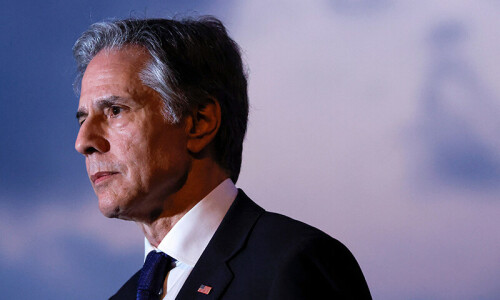ASHDOD: US Secretary of State Antony Blinken reiterated that Washington could not support an attack of this kind and stated on Wednesday that he has yet to see a strategy for Israel’s planned offensive on the southern Gaza city of Rafah that would safeguard civilians.
After a two-and-a-half-hour meeting in Jerusalem between Blinken and Israeli Prime Minister Benjamin Netanyahu, Israel reaffirmed that the Rafah operation would go in spite of US opposition and a clear UN warning that it would result in “tragedy.”
Reporters were informed by Blinken that “we cannot, will not support a major military operation in Rafah absent an effective plan to ensure that civilians are not harmed and no, we have not seen such a plan.”
He said that it was the topic of continuing discussions with Israeli authorities. “There are other ways, and in our judgment better ways, of dealing with the… ongoing challenge of Hamas,” he said.
A spokesman for the Israeli administration stated that Israel is still committed to eliminating the last of the Hamas fighting units.
The spokeswoman stated at a routine briefing, “We are committed to removing the final four of the five Hamas battalions in Rafah. We are sharing our plans with Secretary of State Blinken.”
The top US diplomat’s seventh trip to the Middle East, which was mostly centered on attempts to alleviate humanitarian conditions in Gaza, ends in Israel. The region was rocked by conflict on October 7 when Hamas assaulted southern Israel.
Speaking in Israel’s biggest port, Ashdod, Blinken commended the “meaningful progress” made in recent weeks regarding humanitarian access, noting that new border crossings and the allowance of flour for Gaza to flow via the port were among the measures.
“The progress is real, but it needs to be sustained and accelerated given the enormous need in Gaza,” he stated.
In order to help Gaza, where over half of the population is experiencing horrific hunger, Blinken encouraged the Israeli government to take a number of particular actions, he said.
About a month has passed since US President Joe Biden sent a strong warning to Israel threatening to change Washington’s policy if it does not act to address injury to civilians, suffering of the humanitarian community, and the security of relief workers.
The US envoy also pleaded with Hamas to agree to the cease-fire offered by Egyptian mediators, which would free 33 hostages in return for a greater number of Palestinian detainees and an end to hostilities, with the prospect of future negotiations leading to a more complete agreement.
He declared, “Israel has made very important compromises.” There isn’t time to dicker any longer. The agreement is in place. Hamas ought to accept it.
“Stay-long cease-fire”
Although a senior Hamas official acknowledged that the organization was still reviewing the proposed agreement, he charged Blinken with disrespecting both parties and characterized Israel as the true impediment.
“Reality is contradicted by Blinken’s remarks,” Sami Abu Zuhri told Reuters.
Another official stated that Hamas will reply to the Israeli proposal for a ceasefire in Gaza “within a very short period of time,” emphasizing the necessity of a long-term ceasefire.
He told AFP over the phone from an unidentified location that it was too soon to determine if the Hamas envoys, who had returned to their base in Qatar from discussions in Cairo, believed that any progress had been made. The goal, he emphasized, was “to reach an end to this war.”
According to an Israeli official who spoke to Reuters, Israel is delaying sending a delegation to Cairo for more cease-fire negotiations until after Hamas commander in Gaza, Yahya Sinwar, responds. “We’ll decide what to do only after he responds.”
Whatever the result of the negotiations, Netanyahu has reiterated that the Rafah operation will proceed. According to Israeli media on Wednesday, he is still refusing to budge from Hamas’ main demand, which is that any agreement must entail a lasting truce and the evacuation of Israeli troops.
Netanyahu told Blinken that a Rafah operation “was not contingent on anything,” and he rejected any ideas for a truce that would put a stop to the Gaza war, according to the Prime Minister’s Office, as reported by the news website Ynet.
Netanyahu has been under pressure to move forward with his Rafah offensive despite requests to pause it from nationalist allies who are essential to the survival of his coalition government. Rafah is the last stronghold of Hamas, which Israel has sworn to destroy.








